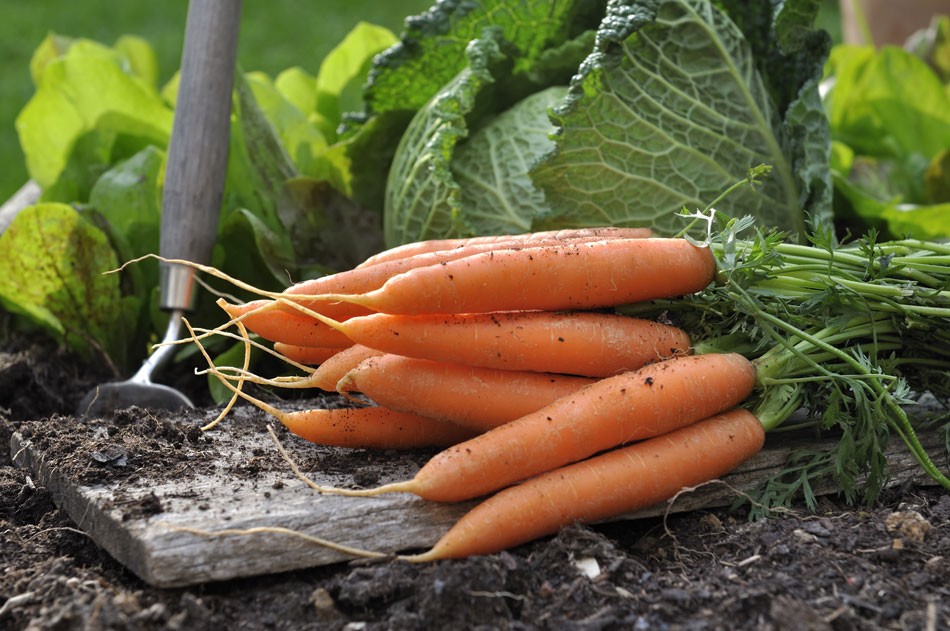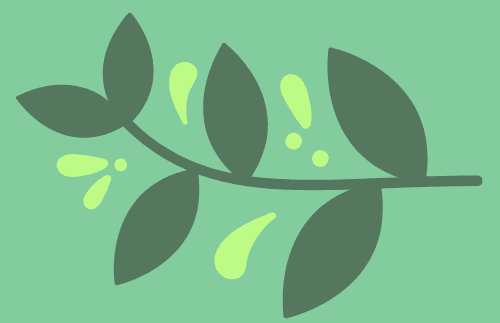Last updated on October 23rd, 2023 at 08:32 pm
In some gardens, the vegetables grow very slowly and bring little harvest. Sometimes even a growth stop can be observed, such as with root vegetables. You’ll learn about the most common causes in this post from the Botany Guide theme week, “Growing Vegetables for Beginners.”
What novice gardener hasn’t experienced it? In the beginning, the home-grown plants grow quite splendidly and give hope for a good harvest. But after a while the vegetables stop growing and make a rather puny impression. There are several reasons why tomatoes, cucumbers and the like do not thrive. Provided all other culture conditions are right, it is often due to the following soil conditions.
Contents
- 1 if the soil is too sandy or clayey, drought & waterlogging becomes a problem.
- 2 the soil is too shallow – when roots end up in a dead-end street.
- 3 compacted soil causes thick air in the soil
- 4 too cold soils inhibit growth
- 5 overfertilized soils weaken the vegetables.
- 6 the soil lacks certain nutrients
- 7 Vegetable plants are not always hardy
- 8 Slow growing vegetables
- 9 Vegetable plants are thirsty
- 10 Vegetable plants are hungry
- 11 Vegetable plants have no space
- 12 The planter is too shallow
- 13 Your vegetable plants have gotten too cold
- 14 Pests annoy your vegetable plants
- 15 The vegetable plants are sick
- 16 Author
if the soil is too sandy or clayey, drought & waterlogging becomes a problem.
In sandy soils, water seeps through quickly, making the soil far too dry for the thirsty vegetables. Dry periods then cause the plants all the more trouble in the summer. As a result, more frequent watering is necessary and harvests tend to be meager. Garden soils with a fairly high clay content, on the other hand, tend to become waterlogged. The water cannot drain away and the roots do not get enough air.
the soil is too shallow – when roots end up in a dead-end street.
Vegetables need a lot of space not only above ground, but also in the soil. Root vegetables in particular need to be able to develop freely in the soil so that they can grow lushly. If the soil is too shallow, the carrots will encounter compacted subsoil or rock after only a short distance. If the plants can’t get any further here, growth is stopped for the time being.
compacted soil causes thick air in the soil
Compacted soil is not only prone to waterlogging, it is also poorly aerated. Soil organisms such as earthworms & co. as well as plant roots need air to breathe. If the soil structure is too dense, air exchange is prevented and the carbon dioxide content increases in the soil. The roots suffocate, so to speak, and die along with the plant. 4.
too cold soils inhibit growth
Many vegetables are sown directly in the open ground. For germination to occur and seedlings to grow well, the soil should not be too cold. Sandy soils warm up quickly in the spring, but cool down just as quickly. However, heavy clay or loam soils can be even more problematic for plant growth. They are very wet and cool down due to evaporative cooling. The vegetables therefore do not have optimal growing conditions even at sowing.
overfertilized soils weaken the vegetables.

Many gardens are over-fertilized. There is often an excess of some nutrients, such as phosphorus or potassium. However, this can inhibit the uptake of other important nutrients. Despite generous fertilization, the hungry vegetables suffer from deficiency symptoms. As a result, tomatoes & co. become more susceptible to pests and diseases. Too much fertilizer also increases the salt concentration in the soil, which in turn is harmful to the roots. Especially root vegetables such as carrots or radishes suffer from this. 6.
the soil lacks certain nutrients
While there is an oversupply of some nutrients in the soil, other equally important minerals are neglected during fertilization. The cause is a too one-sided fertilization of the plants. The deficiency is then manifested by small-growing and poorly developed vegetable plants.
Growth problems in vegetables are usually related to poor soil conditions. The cause is usually one or more of the above factors. How you can find out if and which of these soil problems are present in your garden and how you can best solve them, you will learn here in the article: Determine and improve garden soil: How vegetables grow more luxuriantly.
Sooner or later we all encounter the problem: our vegetable plants do not continue to grow. They stall in their development, don’t flower, don’t produce vegetables, and wear us out.
Fingers up if you’ve ever experienced this? Mine is up!
Vegetable plants are not always hardy
Just like us humans, vegetable plants have a soul – I’m convinced of that. After all, how could a soulless creature produce such delicious little tomatoes and give me such joy?
This soul of vegetable plants is sometimes offended. At best it is thirsty or hungry, but sometimes it fights for its life.
Slow growing vegetables
Now I don’t want to accuse you of being impatient, NO! If your vegetable plant does not continue to grow or grows slowly, it may be because it belongs to the slow growing variety: tomatoes, peppers, eggplant, Brussels sprouts are a few examples. Therefore, they are pre-pulled early in the year and brought as a plant in the ground in the vegetable patch. Please don’t forget that growing up TOO early in the year can cause the vegetable plant to grow very slowly.
Vegetable plants are thirsty
You can recognize this by the fact that their leaves lie sadly on the ground. Especially the heavy growers need a lot of water. These are, among others, zucchini, tomato or even the pumpkin. I often notice that during the day they completely sink into themselves to protect themselves from the sun and heat. As soon as shade falls on them, they happily straighten up again. They do this until they are tall enough for their roots to hold more water.
Vegetable plants are hungry
When the soil lacks nutrients, vegetable plants stop growing. This happens readily and often in smaller planters. In this case, a complete soil replacement, or repotting into a larger container, often helps.
If the nutrients in the raised bed or vegetable bed are no longer sufficient, a good portion of compost soil usually helps. Quick success with artificial fertilizers increases the risk that your vegetable plants will shoot up, but at the same time catch a fungus and become more susceptible. Most often, they will then form only green leaves instead of flowers.
I like to water my vegetable plants with diluted Bokashi juice. I water with it especially often when I notice that they are already particularly bedraggled.
Vegetable plants have no space
There’s a reason for a 30 cm planting distance: lettuce grows really tall. Tomato plants too close together don’t dry out after rain or watering and get the dreaded blight. Plus, the roots don’t have enough room to spread out. The struggle for water and nutrients takes away the energy for vegetable plants to grow.
Two plants of a variety form more fruit when they stand alone. I know impatience and also the saying “a lot helps a lot.” But in this case, the Mini-Max system is the real deal: fewer plants produce more fruit. If you want to know how to easily create a vegetable patch, please read this article.
The planter is too shallow
Often vegetable plants have space, volume technically and in width. However, many manufacturers produce planters that are too shallow. Please don’t ask me what they are for. Most vegetables need space downward to extend their roots. Even a medium rooter prefers a 50 cm depth if it can get it.
Your vegetable plants have gotten too cold
Overzealous, impatient – not you! – Gardeners sometimes put vegetables outside too early in the year. A bell pepper plant will take it very personally if you put it below 10 degrees. Then it can take up to weeks before it decides to keep growing. The same goes for tomatoes, eggplants and the famous loofah cucumber. This one is definitely still on my to do list! In this case, the first thing that helps is: don’t put your plant in the cold! After that, you can wait patiently. The harvest will not fail, but will start later.
Pests annoy your vegetable plants
Yes those pests! No wonder the market is flashing with chemical clubs promising you aphid-free flowers and vegetable plants. Unfortunately, they don’t help in the long run, damaging the plants, the soil, the water and killing beneficial insects at the same time. A Demeter gardener told me that nothing works after the fact. Prevention is the key to success here. That means at least every 2 weeks I should spray my vegetable plants with Bokashi juice. If the infestation is already present, better every 2 days.
The vegetable plants are sick
With this section, I would like to end my article “Help! My vegetable plants won’t grow!”. Most of the time it is a fungus that is affecting the vegetable plants. Fungi are there to decompose the first layer of the plant. The plant was already weakened, its immune system non-existent.
For example, if your tomato has brown leaves despite regular (not too much) watering, you should first remove all brown leaves. Preferably even the shoot. If the fungus continues to spread, take out the whole plant and throw it in the residual waste. It could infect the rest of the plants first and the fungus could infect the compost. If you can make sure your compost pile reaches 70 degrees in the summer, it’s not a problem. If not, then off with the diseased plant into the residual waste.


